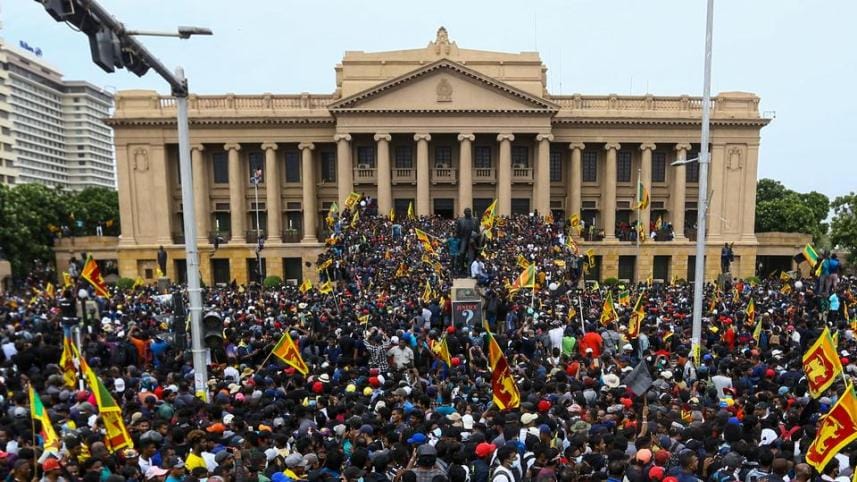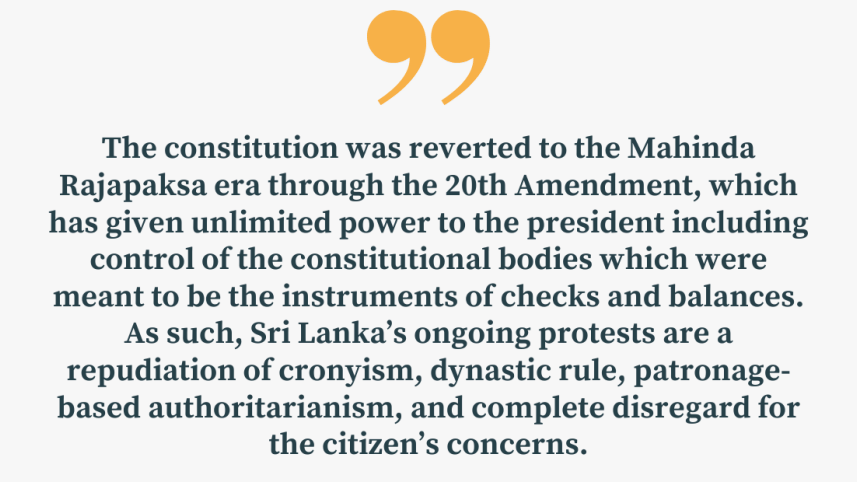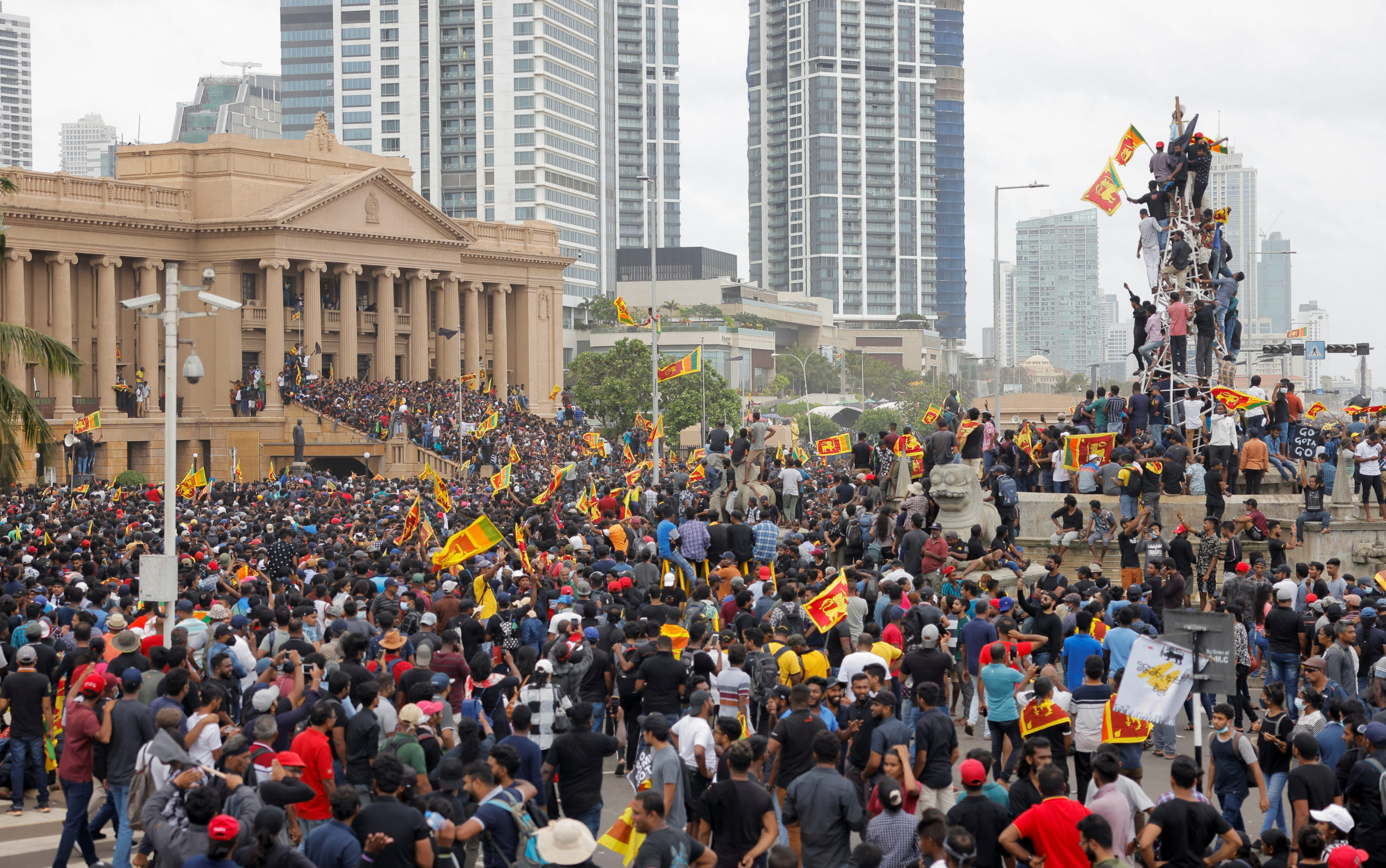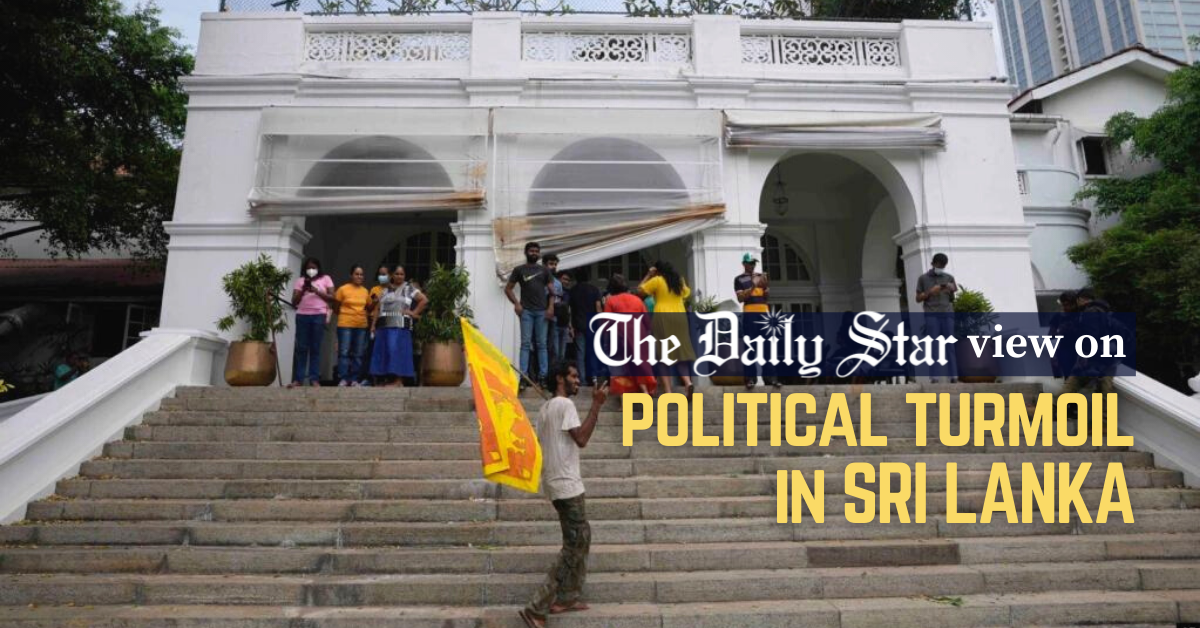Sri Lanka crisis: What role would the military play?

In the latest twist in the ongoing Sri Lankan crisis, President Gotabaya Rajapaksa fled the country on Wednesday morning local time in an air force plane. He previously offered to resign in the face of a sustained popular uprising since March 31. On May 11, his brother, Mahinda Rajapaksa, resigned and went into hiding. The newly appointed Prime Minister, Ranil Wickremesinghe, has also agreed to relinquish power as soon as his successor is chosen by the parliament.
According to the Sri Lankan constitution, if the president resigns, the PM will be the interim president until the parliament decides who should complete the remainder of Gotabaya's term. Demonstrators had taken control of the president's official residence a few days ago. Fourteen members of Gotabaya's family were barred from leaving the country as immigration officials at the Colombo airport declined to process their passports for boarding a plane. However, Gotabaya's wife accompanied him. His younger brother and former Finance Minister Basil Rajapaksa has reportedly fled too. The demonstrators, on the other hand, have vowed not to leave the streets until a new interim government is in place with a clear agenda for reforming the governing system. While these events have been widely covered in the international media and closely watched by political analysts around the world, little has been discussed about the role of the military.
Demonstrations against the government began due to the spiralling cost of food, fuel, and medicine in the past year. The economic crisis became obvious in January when the country defaulted on its loans of USD 51 billion. China declined to restructure the debt and the government was disinclined to negotiate with the IMF for bailouts. In the subsequent months, it became obvious that a solution to the economic crisis is not forthcoming, and the middle class and the poorer segments of the society will have to bear the brunt of it. The ruling Rajapaksa clan was more interested in window-dressing than addressing the crisis. In June, the newly appointed Prime Minister Ranil Wickremesinghe acknowledged that the country's economy has collapsed. While factors such as the terrorist attack in 2019 and the Covid-19 pandemic are blamed as the proximate causes of the crisis, there are other deeper factors which engendered the plight of the country. The economic policies of the government headed by Gotabaya and Mahinda Rajapaksa, especially the misplaced priorities, reckless spending, and increasing debt have been identified as the factors which accentuated the pace of the crisis. The country has fallen into a "debt trap" because it focused on many infrastructural projects with little return and widespread corruption.
However, the protests are not only about the economic woes but also about the system of governance. Since the return of Gotabaya Rajapaksa as the president in 2019 and Mahinda Rajapaksa as the prime minister in 2020, the country returned to the path of authoritarianism which was the hallmark of the Mahinda Rajapaksa's presidency between 2005 and 2015. In the past few years, a family dynasty has been created – in addition to two brothers as the president and the PM, two of their sons were inducted into the cabinet and another was appointed the chief of staff of the PM. There were reports of widespread corruption by the family members and their cronies. The constitution was reverted to the Mahinda Rajapaksa era through the 20th Amendment, which has given unlimited power to the president including control of the constitutional bodies which were meant to be the instruments of checks and balances. As such, Sri Lanka's ongoing protests are a repudiation of cronyism, dynastic rule, patronage-based authoritarianism, and complete disregard for the citizen's concerns.
The patronages doled out in the past years also benefitted the military, among others. Enormous power and wholesale immunity had been provided to the defence forces and security agencies throughout the 25 years of civil war against the Tamils. There are credible allegations of human rights violations by the security forces during the war, including against Gotabaya Rajapaksa, who was the Defense Secretary during the last phase of the war. Although the war had ended in 2009, there has not been much of a rollback of their power and patronage. They have been engaged in enforced disappearances and various other kinds of human rights violations. The notorious "White Van" – often used to abduct political and human rights activists – remained active under the Gotabaya regime. This practice began during the civil war.

When Gotabaya came to power, he began to appoint high-ranking military officials to important positions. In early 2021, a serving military officer, Brigadier Suresh Sally, was appointed as the head of the State Intelligence Service (SIS). The SIS was previously a part of the police department. Sally previously headed military intelligence. Besides, several retired military officials were appointed as secretaries of various ministries. In early 2021, the International Truth and Justice Project (ITJP) reported that at least 14 military and police officials, who served with Gotabaya during the civil war, were appointed to various official positions of great influence.
Despite such close connections to the government, the military has not openly come to the aid of the Rajapaksa regime. On May 11, the military was deployed in the capital city and given order to shoot on sight by the president. But apparently the military has not used its power to quell the demonstrators. At that time, the Chief of Defense Staff and Commander of the Army, General Shavendra Silva, refuted the allegations that the armed forces were poised to shoot at the public to provoke them.
It was reported in the press that Prime Minister Mahinda Rajapaksa was rescued by the military when his home was attacked by the protestors on May 10. As the opposition parties are trying to select a president to replace Gotabaya, and a replacement for the PM, the protestors have vowed that they won't accept an all-party government. Instead, they would like to see a "caretaker government", which will stay in power for about a year and make necessary changes in the constitution to limit the power of the president. They are also afraid that an all-party government will only continue the influence of the deposed president and his supporters as his party has the majority in the parliament.
In the past few days, there have been concerns about whether the situation is heading towards a direction that may lead to a military intervention in politics. Although the military has enjoyed enormous power in Sri Lanka, it has never openly intervened and never dictated to the politicians. Concerns regarding intervention have been expressed after the statement of the Chief of Defense Staff General Shavendra Silva requesting all Sri Lankans to support the armed forces and the police to ensure that peace is maintained in the country. He also said an opportunity has arisen to resolve the current crisis in a peaceful manner. The defence ministry's top official, Kamal Gunaratne, said in a press conference: "None of our officers have a desire to take over the government. It has never happened in our country, and it is not easy to do it here." Some analysts of Sri Lankan politics argue that while the military officials might have thought of helping the Rajapaksa clan, especially Gotabaya, they are less inclined to entangle themselves in politics.
Until now, the military has remained on the sidelines, apparently behaved professionally, but has also reminded the political forces that they are not absent on the scene. As the president has fled the country with the help of the military, many will see this as the military eventually taking a side. How the opposition political parties and the demonstrators will judge the role of the military is an open question. Gotabaya's departure will bring some constitutional issues to the forefront. The opposition will have to pursue prudent and realistic solutions. If the political leaders fail to come up with an acceptable arrangement not only to govern in the coming months but an economic plan to help the citizens, and reform the system which produced authoritarian leaders, the country may have to face some unprecedented situations. The question is, what role will the military will play under such circumstances?
Ali Riaz is a distinguished professor of political science at Illinois State University in the US, and a non-resident senior fellow of the Atlantic Council.




 For all latest news, follow The Daily Star's Google News channel.
For all latest news, follow The Daily Star's Google News channel. 

Comments